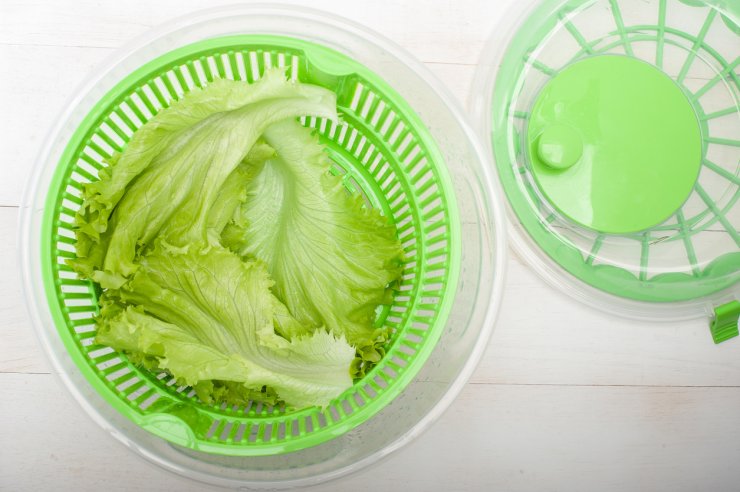
Question: What’s worse than wilted, mushy, refrigerator lettuce stored in single-use plastic? Answer: Nothing. Over the last few years, I’ve been slowly swapping out my single-use food storage items for more sustainable options. One surprising benefit (aside from… you know, saving the planet) is that my produce keeps fresh longer! Not only am I reducing my single-use plastic but I’m no longer throwing out a bag of mushy refrigerator lettuce at the end of the week, either. Talk about a win-win. Here are some of my favorite tips for how to store leafy greens and other produce without using plastic.
Glass container and jars or salad spinners
The name of the game with how to store leafy greens is: airtight. When I come home from the grocery store I rinse all of my leafy greens and either spin or pat them dry. A little moisture left on the leaf is okay. Then I store the greens right in the salad spinner, and they will last way longer than you’d expect. The leftover moisture in the bottom that’s not touching the greens help keep them crisp. You can choose a fully plastic-free option by opting for glass containers with bamboo lids.
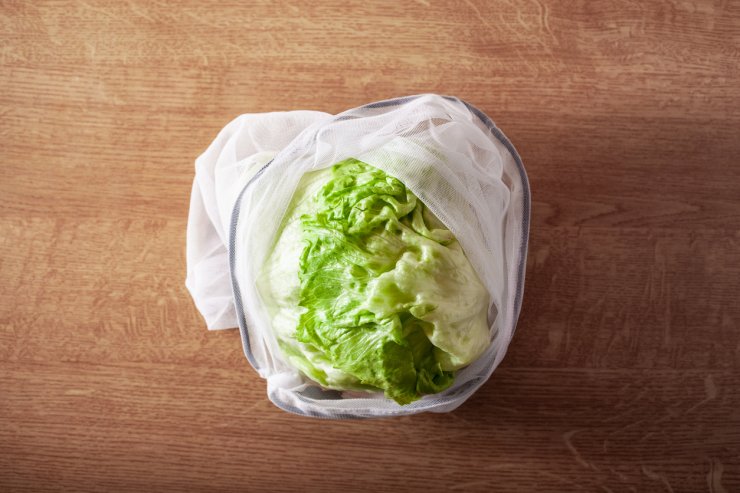
Cloth bags
There are many produce bags on the market that come in mesh style or solid cotton/muslin fabric. I like these bags because they are washable and serve double duty as storage bags as well as grocery produce bags. For storage, I wrap produce like arugula in a dry towel and store it in a mesh bag and find that it stays crisper. I’ll also use these bags to store snap peas and spinach.
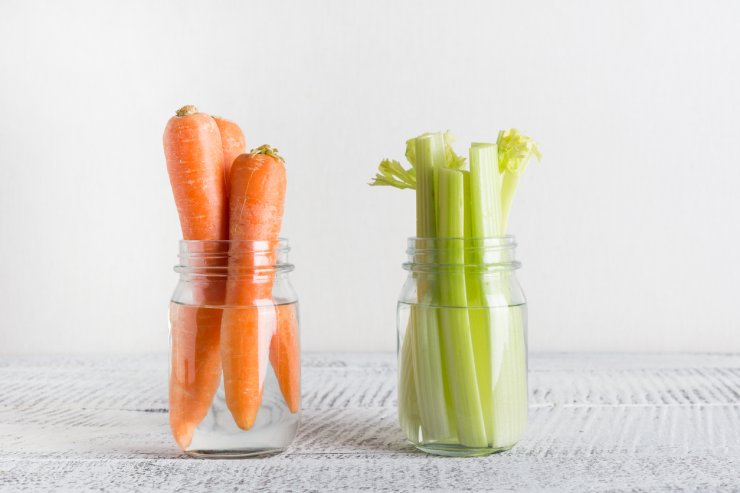
Water
Ever wonder why you see asparagus at the grocery store, sitting upright in a few inches of water? It’s the same reason we place cut flowers in vases of water and add water to our Christmas tree stands after the tree is set in place. If used in the correct way, water can keep many types of produce fresh for longer. Celery, for instance, stores great when it’s upright on the counter in a cup or bowl of shallow water. When thinking about how to store leafy greens like kale and collards, water works best! Store these veggies upright in a cup of water on the counter or refrigerator. Carrots like water too and can be stored by chopping off the tops and placing them in an airtight container with plenty of moisture and dunking them in cold water every few days.
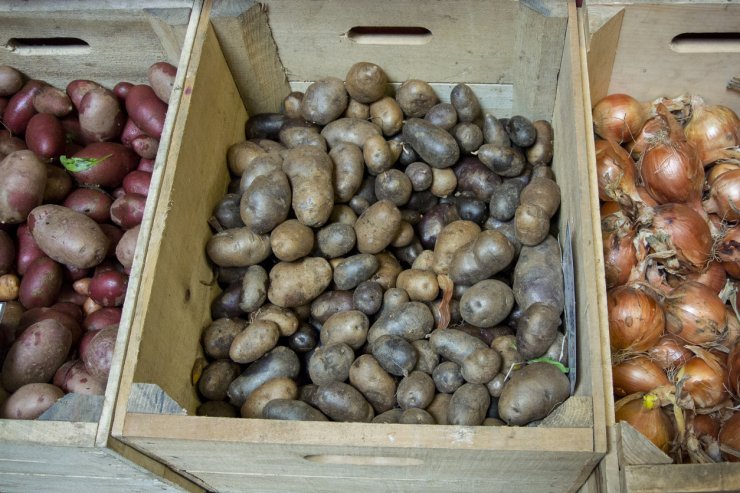
Dark and Dry
Leave the fridge out of it! Some produce does better in a cool, dark corner of your pantry. Vegetables like garlic, onions, potatoes, and winter squash do best in a crate or basket set in a cool, dark place. These vegetables prefer low moisture and a bit of air circulation too. Mesh storage bags work well for storing pantry produce, or you can splurge for stackable crates.
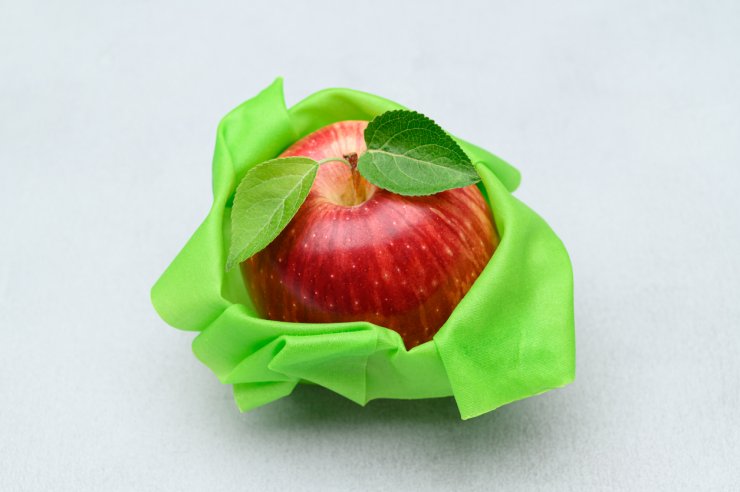
Beeswax wraps
Mind your beeswax! No, but really! Beeswax wraps are an eco-friendly solution that replaces single-use plastic wrap and plastic storage bags. I find the beeswax wrap perfect for storing produce that has been cut into already. Storing half of an avocado or lime couldn’t be easier with this moldable cloth. Another great use is to divvy up berries and grapes into individual snack sizes using beeswax wraps, perfect for school lunches. This wrap also makes a good cover for mason jars and other glass bottles. You can make your own wraps or purchase a set. Beeswax wraps last about a year and then are fully biodegradable after that.
Do you have any tried-and-true tips on how to store leafy greens and other produce without plastic? I want to hear them! Let me know in the comments.


 Previous
Previous


Well, this is plastic, but compared to all the methods I’ve tried, my dinky, space tight fridge, time and hassles of washing up, etc AND the fact I eat a lot of greens and fresh things, this is what’s worked for me.
I started with one container and not have at least six. They’re food grade plastic resembling a salad spinner if it were rectangular. They have a removable mesh bottom liner -over a drain hole plug. There’s another mesh that folds if you want to separate sides. It can also be laid flat for 2 layers. There are two sets of adjustable breathing holes in the lid. My faves haves have lids that bend in the middle so you can open one end. IMO things keep best if not totally airtight. They need a wee bit of air. I wash and shake or spin most things. Things like delicate summer squash either I don’t wash or I’ll allow to dry before storing. I love all the spicy greens including cilantro. People don’t believe me when I tell them I’ve kept cilantro a whole two weeks (depending on its stage of growth and time from harvest) and as new for a full week. No bothering with cloths that have to be washed, little wax bits, no musty old fridge smells, no wasteful paper towels, plasticised freezer paper or fossil fuel waxed paper. Yes, they are plastic. The largest one (my 1st) has been in constant use since before covid – it’s late august 2025 now. The lid cracked and handle broke on a different brand/design/manufacturer but still works fine. Other than soon needing to tape/repair the folding lid on the oldest most used one I gotta say there are a few decent uses for plastic. I cook and store in as much glass as is practical. When they come out with lightweight shatterproof glass big enought to hold a big summer romaine or crisphead I’ll buy one, Until then, I’ll continue with these.
BTW, I’m still using a small plastic bottle that has to be at least 45 years old – made before planned obsolescence became the goal.
Cheers.
In the UK, Lakeland, the household and kitchen firm, sell green plastic bags embedded with stone powder. These seem to prolong the fridge life of greens and beans in particular
I wrap my lettuce in white paper bags from the chemist.
I store other greens ( eg cucumber / peas / broad beans / sweet corn etc) in an air tight plastic container lined with paper or paper bags.
I keep my 1 lb. spinach or spring mix in the original plastic container but I cut about 7 half sheets of paper towels in between layers to absorb moisture. Presently, I’ve had my baby spinach for over 1 week with no signs of breaking down. If I buy the “6 heads of romaine in a bag, I place a full sheet of paper towels on either side. Same with carrots and celery lasting for weeks. Paper towels to absorb moisture.
Yes, I wrap lettuces in paper towels and store in the plastic container they came in. Works, last longer